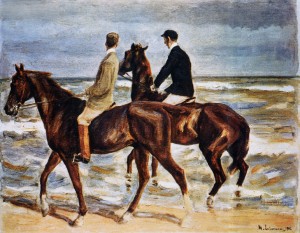To date, only one lawsuit has been filed in the United States related to the seizure from Cornelius Gurlitt’s apartment of some 1,280 works of art, a story that broke a year ago with the concern about the objects’ Nazi-looting connections via his father Hildebrand Gurlitt (the view here last winter was that the longer Germany failed to address the situation comprehensively, the more likely such U.S. litigation became). That lawsuit, brought by David Toren, seeks the return of Two Riders on the Beach (Zwei Ritter am Strand), by Max Liebermann. Germany and Bavaria moved to dismiss the case yesterday, which is particularly puzzling given that among the very few determinations made by the Gurlitt Task Force (in August), it is that the Liebermann should be returned. The cynical view is that they are looking to forestall future claims, but it is past time for the painting to be returned.
Bavaria and Germany Move to Dismiss Gurlitt Litigation, But Raise Questions About Why They Are Resisting a Lawsuit Over Painting that Task Force Recommended They Restitute to David Toren
Topics: Schwabinger Kunstfund, Hildebrand Gurlitt, Cornelius Gurlitt, Breslau, Max Liebermann, Germany, Silesia, Gurlitt Collection, Foreign Sovereign Immunities Act, bailment, Entartete Kunst, FSIA, Restitution, Bavaria, David Toren, Zwei Ritter am Meer, Free State of Bavaria, 28 U.S.C. § 1605(a)(2), Looted Art, World War II, Altmann v. Republic of Austria, Freistaat Bayern, Kunstmuseum Bern, Riders on the Beach, Federal Republic of Germany, Raubkunst, David Friedmann, Münchner Kunstfund



